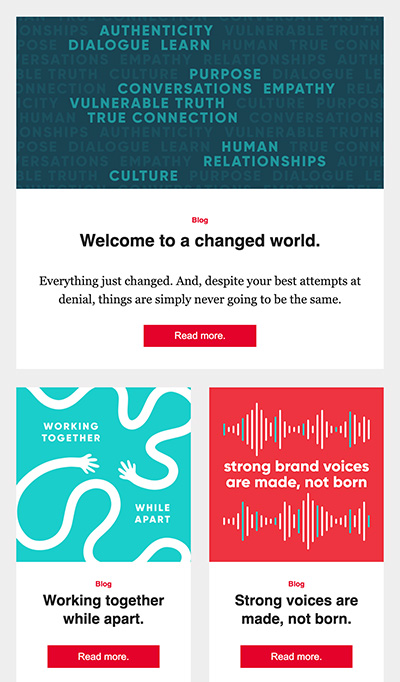AI is changing the way we browse. Successful brands are adapting to the change.
AI is changing the way marketing agencies and brands engage with their audiences. But they still follow time-tested strategies for content development.

Key Takeaways
- Yes, AI is changing the way marketing agencies and brands engage with their audiences. But they still follow time-tested strategies for content development.
- While we don’t currently have a perfect understanding of how AI will change users’ experience, we are seeing some trends in behavior.
- No, this wasn’t written by AI (but it was fact-checked by it).
Before you read this, do me a favor… search “AI will ruin the world.” If your search results are anything like mine, you’ll find Reddit posts lamenting the growth of AI, news articles from years ago warning us that AI can be dangerous, or companies claiming to be experts in AI marketing.
And while some of that commentary might be a bit premature, those fears may also be warranted. It speaks to a lack of understanding of what AI does, how it works, and what its purpose is. Even the programmers behind the top AI platforms don’t fully understand how they work.
But there is one thing that is fundamentally, indisputably true: despite the fears and objections, more and more people are using AI. We analyzed referral traffic across several of the analytics accounts we manage and have seen a 215% increase in sessions since January. In six months, we’ve more than tripled the number of sessions created from AI sources.
We may not understand AI, but we are certainly using it. And for brands, it’ll be important to think about this as they develop content.
How Will AI Affect Marketing?
AI is already having an impact on the world of marketing as some brands have fully embraced the gen AI tools. While it’s okay if you haven’t started actively incorporating generative AI into your work, it’s important to be prepared for what’s to come.
As we mentioned above, AI resources are already starting to drive more traffic to sites, but, more importantly, users coming from AI platforms aren’t landing on traditional entry pages. Instead, over 60% of all traffic coming from AI tools lands on knowledge content, blogs, or resource items.
Ultimately, ensuring that your content answers a key question will be the difference between showing up in an AI result and not.
What about Organic Search? Will AI Affect SEO?
While traffic from AI is growing, it still only represents a small percentage of traffic. Organic Search across all of our accounts represents anywhere from 35-65% of all sessions. AI traffic represents less than 1%.
Even more importantly, AI and Large Language Models (LLMs) more specifically use the same fundamental concept as Organic Search: Content is King. Writing content for any platform should follow the same fundamentals as writing content for Organic Search:
- Use clean and natural prose.
- Stay on brand (don’t write copy specifically to show up in AI or Organic Search results).
- Have a keyword in mind and use it, but don’t force it.
- Think about what you want the user to do with that information.
But There Are Tips And Tricks For Writing Content For AI
Take a look at the headlines for each of these sections. Each is a question that is asked or a search phrase that is searched for frequently, based on data collected using our SEO tools. Based on the data we’re seeing, that seems to be a key element that AI platforms seek out when pulling their results.
Other things AI seeks out to pull their content from:
- A Key Takeaways section at the top of any knowledge content piece.
- Recency. Newer articles seem to take precedence over older articles.
- Use clear, concise language. We often use Hemingway App to simplify our language.
Conclusion
Ultimately, AI is going to continue to grow and become a more ubiquitous part of our lives. And if we’re being honest, we don’t know exactly what that means for user behavior, brands, traditional marketing tactics, or content development. But right now, there are some things that brands can incorporate into their practices that could boost their presence on the platforms.


